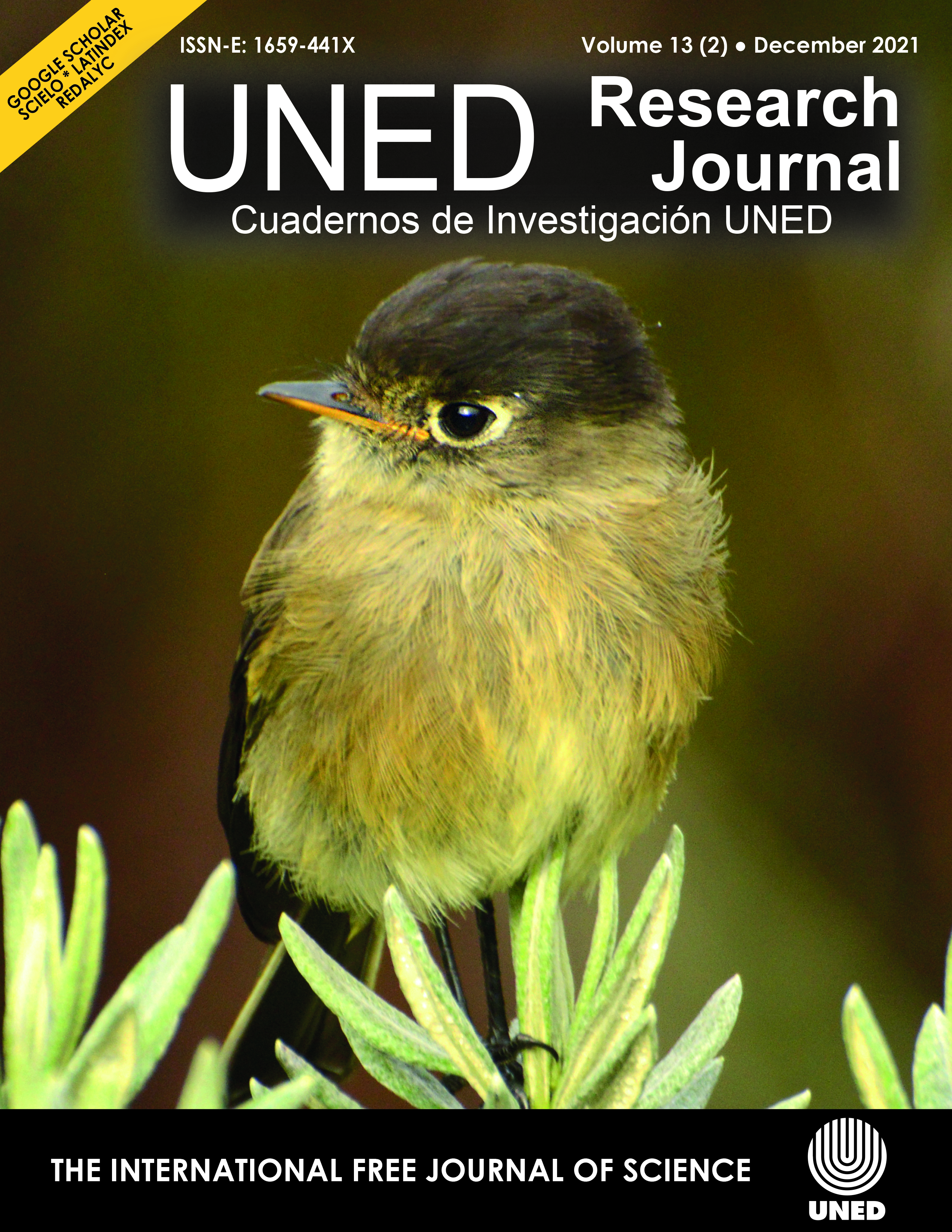The impact of the Covid-19 lockdown on consumer access to organic food in San José, Costa Rica
DOI:
https://doi.org/10.22458/urj.v13i2.3478Keywords:
Food security, Farmers markets, Smallholders, Agroecology, Pandemic, Organic agricultureAbstract
Introduction: The Covid-19 pandemic has led to increased awareness of food security in urban areas and to the role of farmers’ markets in providing essential services to consumers. Objective: To better understand how Covid-19 affected consumer access to organic food at two major organic farmers’ markets in the Costa Rican metropolitan area. Methods: In April 2020 after the strict Costa Rica lockdown, 52 organic market consumers completed online questionnaires regarding their purchasing and consumption patterns. Results: The majority of participants reported decreasing or stopping visits to organic markets (81%). The most frequent source of food during the pandemic was large supermarkets (52%) followed by online or direct delivery from farmers (15%). The majority of participants reported less access to organic products since the onset of the pandemic (71%). Conclusion: Covid-19 has impacted access to organic food at farmer’s markets; recommendations include greater support for direct and online delivery of organic products to increase access to health food.
References
Borras Jr, S. M., & Franco, J. C. (2012). Global land grabbing and trajectories of agrarian change: a preliminary analysis. Journal of Agrarian Change, 12(2), 34-59. https://doi.org/10.1111/j.1471-0366.2011.00339.x
Brown, J., Flint, T., & Lamay, J. (2020, May 1). The politics of pineapple: Examining the inequitable impacts of Southern Costa Rica's pineapple industry. Journal of Public & International Affairs. https://bit.ly/3x9EgGm
Clapp, J. & Moseley, W. G. (2020). The food crisis is different: Covid-19 and the fragility of the neoliberal food security order. The Journal of Peasant Studies, 47(7), 1393-1417. https://doi.org/10.1080/03066150.2020.1823838
FAO (2019). FAO Framework for the Urban Food Agenda. Rome: FAO. http://www.fao.org/publications/card/en/c/CA3151EN/
FAO, IFAD, UNICEF, WFP & WHO (2020). The State of Food Security and Nutrition in the World 2020. Transforming food systems for affordable healthy diets. Rome, FAO. https://doi.org/10.4060/ca9692en
Galt, R. E. (2014). Food systems in an unequal world: Pesticides, vegetables, and agrarian capitalism in Costa Rica. Tucson: The University of Arizona Press. https://doi.org/10.2307/j.ctt180r3hc
Gemmill-Herren, B. (2020). Closing the circle: an agroecological response to Covid-19. Agriculture and Human Values, 14, 1-2. https://doi.org/10.1007/s10460-020-10097-7
Ghosh-Dastidar, B., Cohen, D., HUnter, G., Zenk, S. N., Huang, C., Beckman, R., & Dubowitz, T. (2014). Distance to store, food prices, and obesity in urban food deserts. American Journal of Preventive Medicine, 47(5), 587-595. https://doi.org/10.1016/j.amepre.2014.07.005
HLPE (High Level Panel of Experts on Food Security and Nutrition). 2020. Food Security and Nutrition: Building A Global Narrative Towards 2030. Report #15. High Level Panel of Experts (HLPE), Committee on World Food Security. http://www.fao.org/3/ca9731en/ca9731en.pdf.
iPES Food (International Panel of Experts on Sustainable Food Systems). (2020). Special Report: COVID-19 and the Crisis in Food Systems. http://www.ipes-food.org/_img/upload/files/COVID-19_CommuniqueEN%283%29.pdf
Laguna, L., Fiszman, S., Puerta, P., Chaya, C., & Tarrega, A. (2020). The impact of Covid-19 lockdown on food priorities. Results from a preliminary study using social media and an online survey with Spanish consumers. Food Quality and Preference, 86, 1-9. https://doi.org/10.1016/j.foodqual.2020.104028
Ohantcabal, G., & Narbondo, I. (2018). Land grabbing in Uruguay: new forms of land concentration. Canadian Journal of Development Studies 40(2) 201-219. https://doi.org/10.1080/02255189.2018.1524749
Sylvester, O., & M. Little (2020). "I came all this way to receive training, and now I am going to be taught by a woman." Factors that support and hinder women's participation in agroecology in Costa Rica. Agroecology and Sustainable Food Systems, 1-24. https://doi.org/10.1080/21683565.2020.1811830
Weatherspoon, D. D., & Reardon, T. (2003). The rise of supermarkets in Africa: implications for agrifood systems and the rural poor. Development Policy Review, 21(3), 333-355. https://doi.org/10.1111/1467-7679.00214
Zurayk, R. (2020). Pandemic and food security: a view from the Global South. Journal of Agriculture, Food Systems, and Community Development, 9(3), 17-21. https://doi.org/10.5304/jafscd.2020.093.014
Published
How to Cite
Issue
Section
License
Copyright (c) 2021 UNED Research Journal

This work is licensed under a Creative Commons Attribution 4.0 International License.
Note: This abstract contains an incorrect copyright due to technical issues. Authors who publish with this journal agree to the following terms: Authors retain copyright and grant the journal right of first publication with the work simultaneously licensed under a Creative Commons Attribution License that allows others to share the work with an acknowledgement of the work's authorship and initial publication in this journal
All journal contents are freely available through a CC BY 4.0 license.
CC BY 4.0 is a Creative Commons: you can copy, modify, distribute, and perform, even for commercial reasons, without asking permission, if you give appropriate credit.
Contents can be reproduced if the source and copyright are acknowledged according to the Open Access license CC BY 4.0. Self-storage in preprint servers and repositories is allowed for all versions. We encourage authors to publish raw data and data logs in public repositories and to include the links with all drafts so that reviewers and readers can consult them at any time.
The journal is financed by public funds via Universidad Estatal a Distancia and editorial independence and ethical compliance are guaranteed by the Board of Editors, UNED. We do not publish paid ads or receive funds from companies.




